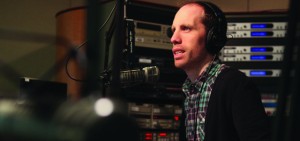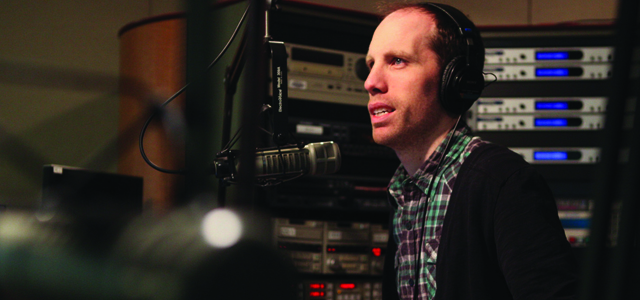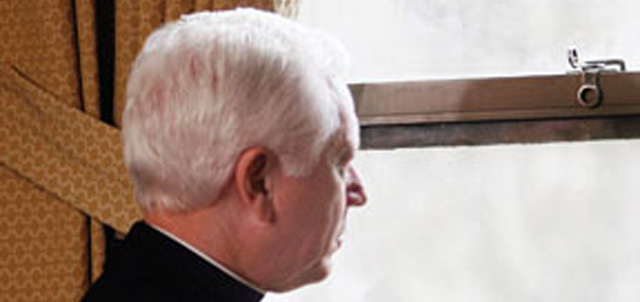Jeff Regan ’98 excels at discovering the next big thing in alternative music.
It’s all about connections: with the music, with the audience.
Every song Jeff Regan ’98 schedules as director of programming for Alt Nation, SiriusXM’s alternative rock station, has been carefully chosen because “what matters is that human connection,” says Regan. “Art does that, unlike most other things on this planet.”
Regan is always hoping to discover the next Arcade Fire or Kings of Leon, bands that can fill stadiums with screaming fans. Maybe he’ll check out a little-known blog and pluck out an obscurity like Atlas Genius, an Australian band whose song “Trojans” became a success on Billboard’s alternative hits chart. Or maybe he’ll take a tip from a fellow employee and program a cut by the Brooklyn rock group American Authors. It’s a crapshoot, but finding “The Next Big Thing” is the ultimate goal.
“I always try to understand who in two years from now will be the next phase of flagship artists for this format, and try to find them now and introduce them to our audience,” says the 38-year-old Regan. “My job is to curate the playlist at SiriusXM and build new artists.”
“[Regan] has a passion for the music. He knows his audience, and he does a really good job at ID-ing what his listeners want, and taking shots on up-and-coming music,” says Mike DePippa ’96, vice president of rock and alternative promotion for Columbia Records. “Obviously a lot of thought goes into that. You see what’s going on online and in the press; he takes all that into consideration.”
A native of Ridgefield Park, N.J., Regan entered college as a business major, but “there was no connection there.” Since he was the kid, he was someone who at parties would take a stack of CDs and program the music, so he decided to get involved with Seton Hall’s radio station, WSOU, which he listened to throughout high school.
WSOU is boot camp for radio buffs: a semester of training and meetings, learning the rules. Then producing for other hosts; answering the request line; reading the news. And then, some students get to host their own show — on whatever shift is available.
All of that taught Regan what he still applies today in his work: That “you are serving the public interest; your listeners make your station. Also the legacy of breaking music, the advocacy they had for the artists. There wasn’t commercial support for many of the bands on the playlist. That I hold as the pinnacle to what I do today.”
Before Sirius, Regan spent six years at Z100 in New York, a top 40 station that was very popular but very rigidly formatted.
So in 2002, when the opportunity at Sirius came along, Regan jumped at it. What he’s programming as “alternative” are generally guitar-heavy bands, most of whom write their own music, Regan says. “Most of the music we play is not overly produced. And it’s not necessarily produced for mainstream consumption.”
To find these groups, Regan checks music blogs and websites, listens to original songs on Internet platforms like Bandcamp. He scours British and Australian music charts and follows recommendations from a network of musician friends. He’s also big on checking to see how he’s doing.
“I look at the feedback via social media, I check a band’s Twitter feed, and I’ll check sales on the song,” says Regan. “At the end of the day, people are paying money to hear what I’m doing [Sirius is a subscription service]. And the beautiful thing is they will still go out and buy records, go out to see the bands, and I will see single sales go up based on our airplay — immediately.”
“As recently as five years ago, the alternative station in most markets was an active rock station, or a ’90s grunge station,” says Sean Ross, author of the “Ross on Radio” column on Billboard.biz. “Alt Nation was able to give pure alt music exposure it couldn’t get anywhere else, and as such, it is probably a significant reason that the format has shifted back to being more pop, more melodic, and more distinctive.”
 It’s a funny thing: The death of radio has been reported for years. It’s too old, too formatted and boring, claim its critics. But it’s still creatively alive and kicking, especially on college stations, and in the do-your-own-thing ethos of Sirius’ more than 75 niche-oriented music channels.
It’s a funny thing: The death of radio has been reported for years. It’s too old, too formatted and boring, claim its critics. But it’s still creatively alive and kicking, especially on college stations, and in the do-your-own-thing ethos of Sirius’ more than 75 niche-oriented music channels.
“I still think it’s the human connection,” says Regan of radio’s continuing popularity. “People exist in their cars; it’s a technology they feel comfortable with. There is the excitement of not knowing what’s next, being introduced to something you might not know otherwise. I think we do it better than anyone.”
Lewis Beale is a North Carolina-based journalist who writes about entertainment and culture.








Great Post. Thanks for sharing